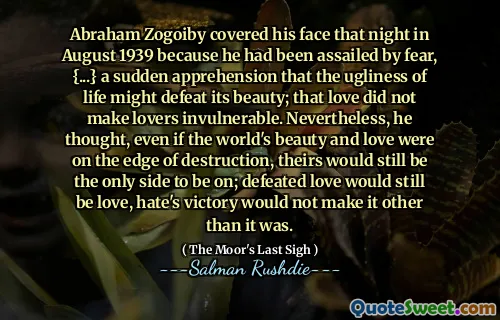
Abraham Zogoiby covered his face that night in August 1939 because he had been assailed by fear, {...} a sudden apprehension that the ugliness of life might defeat its beauty; that love did not make lovers invulnerable. Nevertheless, he thought, even if the world's beauty and love were on the edge of destruction, theirs would still be the only side to be on; defeated love would still be love, hate's victory would not make it other than it was.
Abraham Zogoiby, in August 1939, found himself overwhelmed by fear, sensing that the harsh realities of life could overshadow its beauty. This deep anxiety led him to cover his face, as he grappled with the troubling thought that love might not be a shield against the world's darkness. Despite this fear, he clung to the idea that even in a world fraught with danger and despair, the love shared between him and his partner remained invaluable.
He resolved that, regardless of the external turmoil, their love was worth defending. Even if love faced defeat in a broader sense, it still held intrinsic value. Zogoiby's reflections illustrate a profound understanding that love's essence is unaltered by the world's failures, asserting that hate's triumph cannot diminish the purity of true love.






